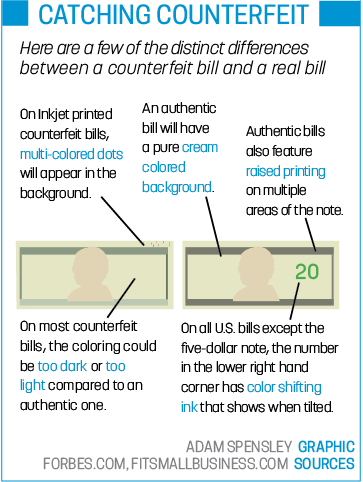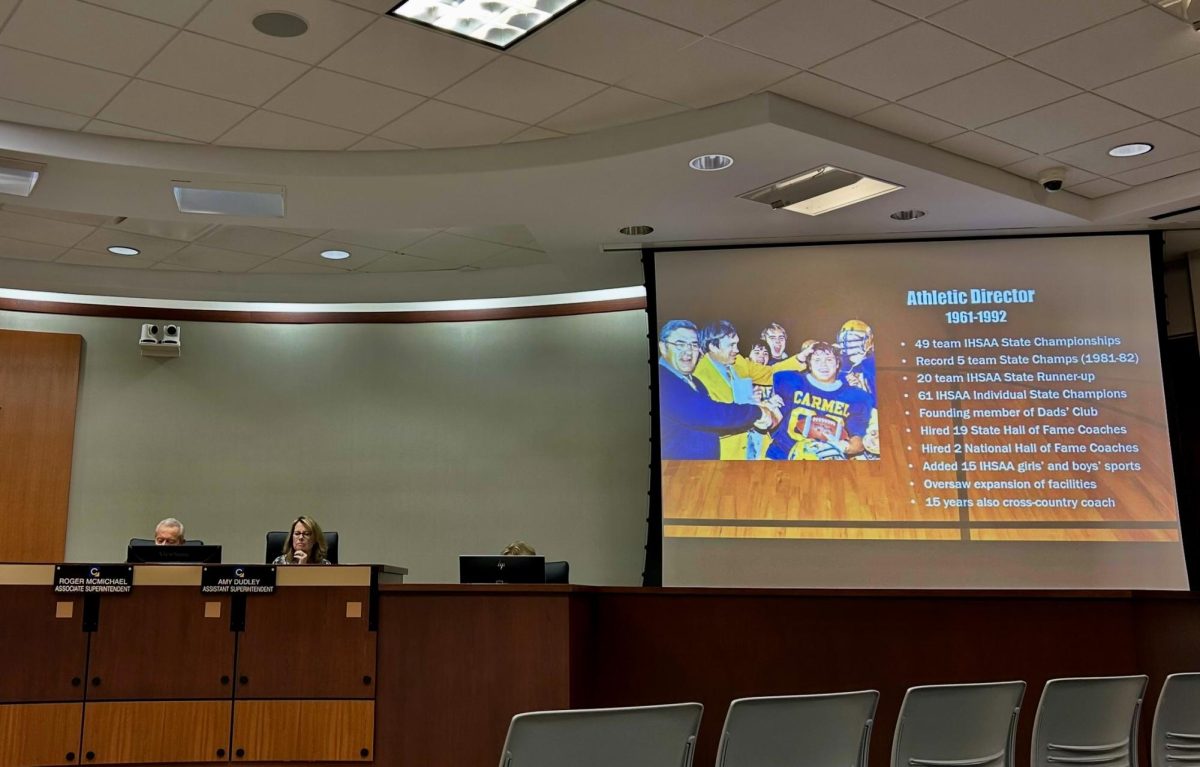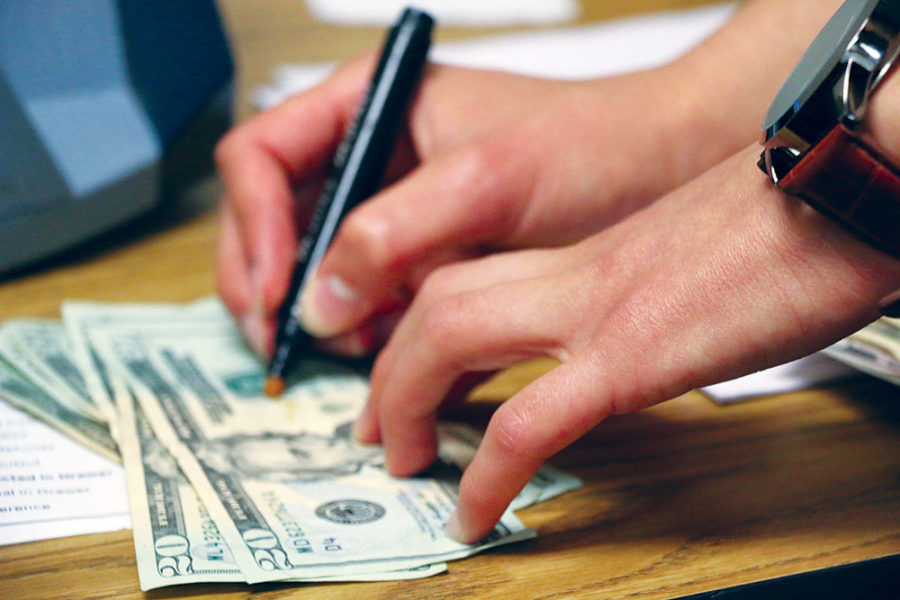While on her way to work at Amanda’s Exchange, a local consignment shop on Carmel Drive, junior Katie Sankey received an unusual message from her manager. According to Sankey, the message warned all employees about a possible influx of counterfeit money circulating through businesses in Carmel.
“I was kind of shocked that something like this could happen in Carmel,” Sankey said. “When you think of crime, the things that come to mind are murder or theft. No one ever hears about counterfeit money being passed around.”
The rise of counterfeit money in Carmel is not an isolated incident. Many cities across the nation are seeing this trend, such as Indianapolis, where Indiana State Police found more than $1,000 in counterfeit money in the possession of two women just last month. Sergeant D. J. Schoeff, one of the resource officers at this school, can attest to this; he said counterfeit money is a problem that often goes unnoticed.
“There will be times where we see little lumps (of counterfeit cases) or a few of them dispersed out,” Schoeff said. “But the reality is that counterfeit money being distributed sometimes is inadvertent, meaning you could have a counterfeit five-dollar bill in your purse right now and you wouldn’t even know it.”
With advancements in technology, counterfeit money is becoming harder to detect, Schoeff said. He said people can mark bills with a counterfeit pen to ensure its validity. If a black stain appears, the bill is not genuine.
“My manager is now requiring us to always mark the cash that we receive from customers to make sure that (it isn’t) fake,” Sankey said. “If we get a payment that doesn’t look right, we have to immediately tell our manager who will then notify the police.”
Like local businesses, CHS’s DECA has established a counterfeit protocol when dealing with cash transactions in the Carmel Café.

“DECA’s protocol is to check bills that are $20 or higher that we receive with the marker,” Bryce Hull, DECA chief financial officer and senior, said. “We have also transitioned into accepting electronic payments which also helps to prevent (counterfeit) situations from happening.”
If a bill looks or feels different, Schoeff said he encourages students and employees alike to report the situation to local law enforcement.
Schoeff said, “In the end, you should always notify the authorities because if we don’t learn of (the counterfeit bill), there may be several of them discreetly floating around the city, which makes it harder to identify the source of the problem.”





























![Keep the New Gloves: Fighter Safety Is Non-Negotiable [opinion]](https://hilite.org/wp-content/uploads/2024/12/ufcglovescolumncover-1200x471.png)






!["Wicked" poster controversy sparks a debate about the importance of accuracy versus artistic freedom [opinion]](https://hilite.org/wp-content/uploads/2024/11/riva-perspective-cover-1200x471.jpg)









































![Review: “We Live in Time” leaves you wanting more [MUSE]](https://hilite.org/wp-content/uploads/2024/12/IMG_6358.jpg)
![Review: The premise of "Culinary Class Wars" is refreshingly unique and deserving of more attention [MUSE]](https://hilite.org/wp-content/uploads/2024/12/MUSE-class-wars-cover-2.png)
![Introducing: "The Muses Who Stole Christmas," a collection of reviews for you to follow through winter [MUSE]](https://hilite.org/wp-content/uploads/2024/12/winter-muse-4.gif)
![Review: "Meet Me Next Christmas" is a cheesy and predictable watch, but it was worth every minute [MUSE]](https://hilite.org/wp-content/uploads/2024/11/AAAAQVfRG2gwEuLhXTGm3856HuX2MTNs31Ok7fGgIVCoZbyeugVs1F4DZs-DgP0XadTDrnXHlbQo4DerjRXand9H1JKPM06cENmLl2RsINud2DMqIHzpXFS2n4zOkL3dr5m5i0nIVb3Cu3ataT_W2zGeDAJNd_E-1200x884.jpg)
![Review: "Gilmore Girls", the perfect fall show [MUSE]](https://hilite.org/wp-content/uploads/2024/11/gilmore-girls.png)
![Review in Print: Maripaz Villar brings a delightfully unique style to the world of WEBTOON [MUSE]](https://hilite.org/wp-content/uploads/2023/12/maripazcover-1200x960.jpg)
![Review: “The Sword of Kaigen” is a masterpiece [MUSE]](https://hilite.org/wp-content/uploads/2023/11/Screenshot-2023-11-26-201051.png)
![Review: Gateron Oil Kings, great linear switches, okay price [MUSE]](https://hilite.org/wp-content/uploads/2023/11/Screenshot-2023-11-26-200553.png)
![Review: “A Haunting in Venice” is a significant improvement from other Agatha Christie adaptations [MUSE]](https://hilite.org/wp-content/uploads/2023/11/e7ee2938a6d422669771bce6d8088521.jpg)
![Review: A Thanksgiving story from elementary school, still just as interesting [MUSE]](https://hilite.org/wp-content/uploads/2023/11/Screenshot-2023-11-26-195514-987x1200.png)
![Review: "When I Fly Towards You", cute, uplifting youth drama [MUSE]](https://hilite.org/wp-content/uploads/2023/09/When-I-Fly-Towards-You-Chinese-drama.png)
![Postcards from Muse: Hawaii Travel Diary [MUSE]](https://hilite.org/wp-content/uploads/2023/09/My-project-1-1200x1200.jpg)
![Review: "Ladybug & Cat Noir: The Movie," departure from original show [MUSE]](https://hilite.org/wp-content/uploads/2023/09/Ladybug__Cat_Noir_-_The_Movie_poster.jpg)
![Review in Print: "Hidden Love" is the cute, uplifting drama everyone needs [MUSE]](https://hilite.org/wp-content/uploads/2023/09/hiddenlovecover-e1693597208225-1030x1200.png)
![Review in Print: "Heartstopper" is the heartwarming queer romance we all need [MUSE]](https://hilite.org/wp-content/uploads/2023/08/museheartstoppercover-1200x654.png)




